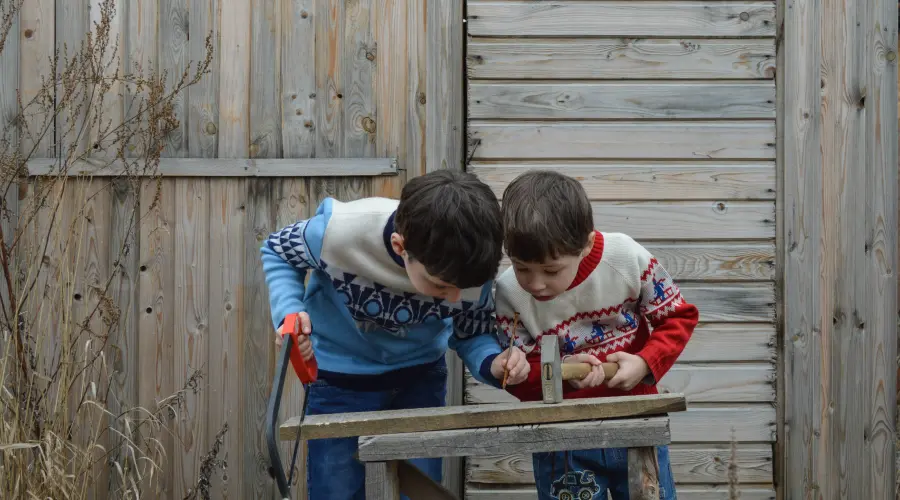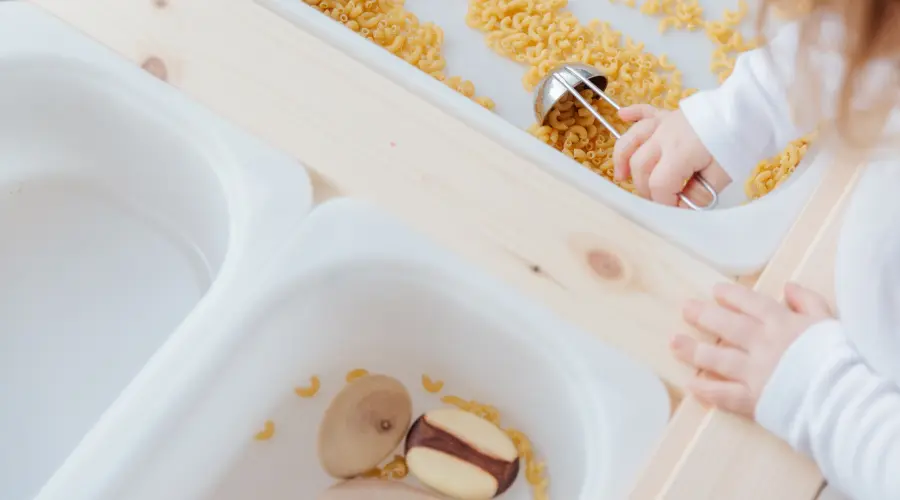settings
children
With Famly since
As a parent or carer, it’s easy to find plenty of resources about expected patterns of child development.
The trouble is, without context, these linear progression models of what children should do when can be interpreted too literally. Parents and carers may believe that if their child doesn’t meet every one of those milestones ‘on schedule’, something must be wrong. This is where your expertise and partnerships with parents and carers really come into play.
Sharing information about children’s development with parents on an ongoing basis can reassure anxious parents that their child isn't falling behind and provide the best framework for support if they are.
Explaining how we apply developmental milestones in early years settings
Parents who are new to early years settings may feel anxious about their child being assessed too much or fear they will be ‘labelled’ early on. You may also meet parents who prefer a lot of data or reporting on their child’s development, so they can feel reassured that their child is ‘on track’.
Finding out more about parents’ expectations and explaining how you’ll share how their child is doing is a key part of their induction into your setting. The settling-in period allows you to discuss with parents and carers how you record and support development in the early years.
The most important message to share about milestones, such as the observation checkpoints in Development Matters or the statements in the Developmental Pathways in the Curriculum for Wales, is that they are for guidance only.
Not meeting one statement or milestone ‘on time’ is not immediately a cause for concern as child development is unique to each child. Educators’ expertise and knowledge of the children in their setting are what allow them to determine whether a child is making good progress, either in regard to their age or their starting points.

The message to share with parents: Your child’s development is completely unique.
“Each child is unique, and while we can be guided by an understanding of some general patterns of development from pre-birth into early childhood, progression is uneven and unfolds differently for each individual child. The complex differences for each child mean the pathways toward maturity should be seen more as dancing around a ballroom than climbing a ladder.”
Birth to 5 Matters Guidance, Early Education on behalf of the Early Years Coalition.
“It is important we understand that learning is not linear and that different children are likely to progress in markedly different ways. We must recognise this and allow for a variety of diversions, stops and spurts in a child’s learning journey.”
A curriculum for funded non-maintained nursery settings, Education Wales
“The terms of ‘when I am a baby’, ‘when I am a toddler’ and ‘when I am a young child’ have been used to illustrate developmental needs over time – but these should not be seen as rigid lines of progression. All babies and young children develop their individual skills, knowledge and attributes at different rates according to who they are.”
Realising the ambition: Being Me National practice guidance for early years in Scotland
What about assessment and tracking?
Parents can feel really anxious about the assessment of their child’s development so reassure them that a conversation about their child’s progress will never be a surprise. As you observe and interact with their child each day, you’ll be sharing what you see with parents and carers, including any achievements or concerns. They won’t receive an end-of-term assessment suddenly telling them their child is behind.
If you use a platform like Famly, ensure parents know where to find their child’s observations and assessments, so they can feel informed about how things are going. If you’re still paper-based, allow parents frequent access to their child’s paper learning journal.
If you complete a baseline assessment when a child starts, ensure that parents have an opportunity to contribute, to lay the foundations for partnership working on assessment and development. This will help you to set the scene for parents and carers about how and why we assess in the early years. Inform parents that:
- It is not a test
- You’re simply working with them to find out what their child is interested in, already knows, and has achieved
- It’s a collaborative process between you, them, and the child.
- Assessments enable you to provide experiences to deepen their child’s learning and help them progress.
And, whether you work to your own curriculum or use a statutory one, it’s a good idea to share this with parents and carers too. Not only does this help contextualise the experiences you deliver in your setting, but it can also support parents with learning at home. The more transparent you can be, the more reassured and confident parents will be.

The message to share with parents: Don’t worry if you haven’t received lots of assessment and tracking data - we’re spending the time with your child.
“Assessment should not entail prolonged breaks from interaction with children, nor require excessive paperwork. When assessing whether an individual child is at the expected level of development, practitioners should draw on their knowledge of the child and their own expert professional judgement and should not be required to prove this through collection of physical evidence.
Statutory guidance: Early years foundation stage (EYFS) statutory framework
“Assessment should not be a tick list or a one-off event. It should be a continuous process that is useful, manageable and purposeful, both to us and to children’s progress. Assessment should be indistinguishable from teaching and learning.”
A curriculum for funded non-maintained nursery settings, Education Wales
Supporting and sharing developmentally appropriate expectations
Whether your setting supports children under 5 to build fires and use tools, or sit in small groups for phonics practice, parents and carers will want to know how and why you deliver the education that you do.
Some parents may favour a more traditional, disciplined, “classroom” teaching style, so they might need some extra information from you about the importance of co-regulation and learning through play. Some parents may believe that pre-schoolers are too young for a structured curriculum, and so may need some more information about how teaching looks in the early years.
Sharing why provision, resources, activities, or approaches you use are developmentally appropriate shows parents the knowledge and thought behind the decisions you make. Building partnerships with parents through sharing why you do what you do for their unique child not only builds trust and respect but also helps parents to deliver developmentally-appropriate experiences at home too.

The message to share with parents: Play is learning - there’s no rush to the ‘finish line’ in terms of development.
“The guidance can help you check that children are secure in all the earlier steps of learning before you look at their ‘age band’. Depth in learning matters much more than moving from one band to the next.”
Development Matters, Non-statutory curriculum guidance for the early years foundation stage.
“Play is essential for children’s development, building their confidence as they learn to explore, relate to others, set their own goals and solve problems. Children learn by leading their own play, and by taking part in play which is guided by adults.”
Statutory guidance: Early years foundation stage (EYFS) statutory framework
“Development is rapid from birth to age five, as babbling becomes conversation and as physical movements become increasingly more complex and sophisticated. It is important to value this period of time and to nurture the playfulness and curiosity of children. The temptation for us to rush through skills, knowledge and experiences can have an adverse effect on the next stages of learning. At every stage of development, we should remain focused on the present needs and not those of the coming year(s).”
A curriculum for funded non-maintained nursery settings, Education Wales
How can we work in partnership with parents to record and celebrate children’s development?
No one knows the children in your setting better than their parents or carers, so embrace their knowledge right from the start. A thorough induction or settling-in process allows parents and carers to share:
- What they know their child knows and can do
- Their interests and things they particularly enjoy
- Any areas of concern
- Any already-identified areas of delay or diagnosed conditions that require special support
You could ask parents to complete an ‘all about me’ document and ensure there’s time to speak in-depth about the child before their first session. Especially where special need or disability is already known, this gives you a fantastic opportunity to learn more about where the child is successful and where they need extra help.
However, sharing this information once, when a child first starts, is not enough. Parents should feel continually involved as partners in learning. At your setting, reflect on how well you’re:
- Having frequent discussions about children’s progress
- Supporting learning at home, either through resources or activity and experience inspiration
- Sharing observations you make with parents and carers
Encouraging parents to share their own observations of what children are doing outside of the setting, so they can add to their child’s learning journey too.

The message to share with parents: We’re working with you, in partnership.
“Parents make a crucial difference to children’s outcomes. Parents are children’s first and most enduring educators”
Birth to 5 Matters Guidance, Early Education on behalf of the Early Years Coalition.
“Families are central to the child’s learning at home and in their community, to their acquisition of skills, capacities and attributes. Therefore, it is essential that as practitioners we develop strong links with parents in shaping the curriculum”
Realising the ambition: Being Me National practice guidance for early years in Scotland
“Building trusting relationships between the home and our setting, where we share the same aspirations for learning and development, nurtures children’s well-being and sense of belonging. Recognising parents and carers as the child’s first educator and valuing what they know about their child is vital not only for smooth transition from home to setting, but also for ongoing effective partnerships.”
A curriculum for funded non-maintained nursery settings, Education Wales
The big ideas
Top tips from Alphabet House
Get top tips from a setting just like yours. Hear from Alphabet House on why and how they use Famly - and why they’ve never looked back.
Read their story







.png)


